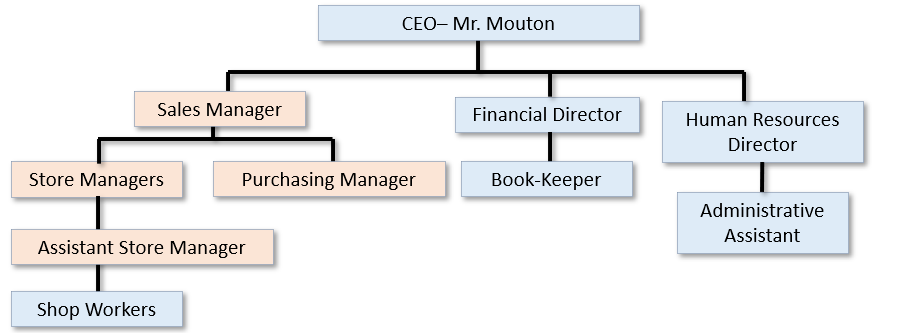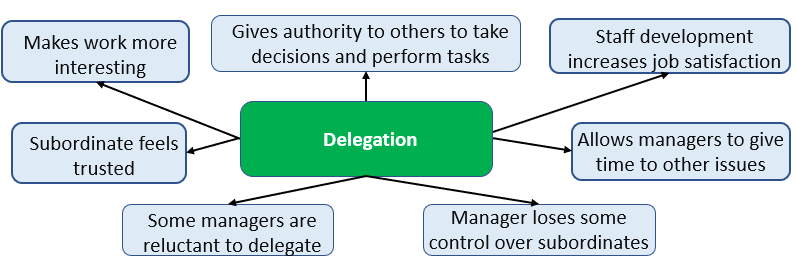AS Business Studies 9609
Business Studies – 2.3 Management
- Traditional functions of managers
- The impact of managers on business performance
- The role of managers – Mintzberg and Fayol
- Management Styles – Autocratic, Democratic, Paternalistic and Laissez-faire
- McCregor’s Theory X and Y managers
Traditional functions of managers
Most companies will have managers if it’s not a micro business or sole trader. Managers may also have different titles such as leader, director, and head of department. By looking at an organisational chart for a business it’s clear to see who has subordinates and therefore will need to perform the functions of a manager.
Organisational Structure refers to the level of management and division of responsibilities within a company. The organisational structure is often presented in the form of a chart showing the roles and responsibilities within a business.

.
Traditional functions of managers
- Planning and setting objectives
- Organising resources
- Directing and motivating employees
- Controlling performance
- Coordinating activities
Delegation
Delegation means giving a subordinate authority to perform particular tasks. When managers delegate it is the authority to perform a task which is being delegated not the final responsibility. If the job is done badly by a subordinate it’s the manager who has to accept the responsibility. For a business to perform well managers must be able to delegate for a wide range of reasons.
Advantages of delegation for the manager
- Frees up time for the manager
- Managers can focus on important tasks and prioritise
- Allows for increased productivity
- Fewer mistakes are made – managers are not overworked
- Managers can measure the success of employees
Advantages of delegation for the subordinate
- More interesting and rewarding work
- Employees feel important, trusted and valued
- Motivates employees as they feel trusted
- Provide training for employees
- Subordinates could get promotions if they upskill
It can take time for an inexperienced manager to delegate effectively. It’s important to realise that one person can not do everything and for a business to perform well managers must delegate, plan, control and manage resources effectively.

The impact of managers on business performance
The role of managers – Mintzberg and Fayol
Mintzberg divided the roles of a manager into three main functions with ten roles that managers have to undertake.
| Function of manager | Role of the manager |
|---|---|
| Interpersonal | 1. Figurehead 2. Leader 3. Liaison |
| Informational | 4. Monitor 5. Disseminator 6. Spokesperson |
| Decisional | 7. Entrepreneur 8. Disturbance handler 9. Resource allocator 10. Negotiator |
Management styles
Autocratic
Autocratic managers expect to be in charge and give commands to employees.
Democratic
Democratic managers involve employees in the decision-making process.
Paternalistic
Paternalistic managers are concerned for the well-being of employees. Health and safety will be a priority for this management style.
Laissez-faire
Communicates the objectives of the business to employees, but then they are left to make their own decisions and organise their work. Laissez-faire managers give employees freedom, this management style works well in companies with highly educated employees that need to be creative. Think software developers.
.
.
McGregor’s Theory X and Y managers
Douglas McGregor believed that managers can be divided into two different types Theory X or Y managers.
Theory X Managers
- Employees dislike work and responsibility
- Subordinates need to be directed
- Employees are financially motivated (Taylorism)
- Employees must be closely supervised (monitored)
- Subordinates need to be controlled and coerced into achieving organizational objectives
Theory Y managers
- Subordinates want to work hard
- Employees could enjoy work
- Employees can exercise substantial self-control.
- Managers trust employees
Theory X managers: managers view employees as lazy and they dislike work.
Theory Y managers: managers view employees as enjoying work, and prepared to accept responsibility.
Section A 2.3 Management Practice for Paper One
Section B 2.3 Management Practice for Paper One
Students are also Interested in:
Revision Videos

Management questions
.

Leadership Styles
.

Mintzberg’s roles
.

Range of Business Topics
Lorem ipsum dolor sit amet, consectetur adipiscing elit.

Expert Teacher
Lorem ipsum dolor sit amet, consectetur adipiscing elit.

Unlimited Access
Lorem ipsum dolor sit amet, consectetur adipiscing elit.
Get Additional Business Studies Resources!
Get access to additional business studies resources including sample questions and detailed examination feedback.
